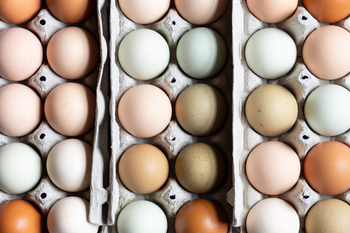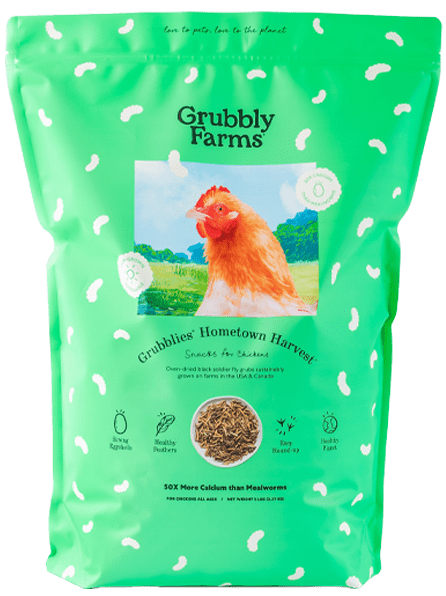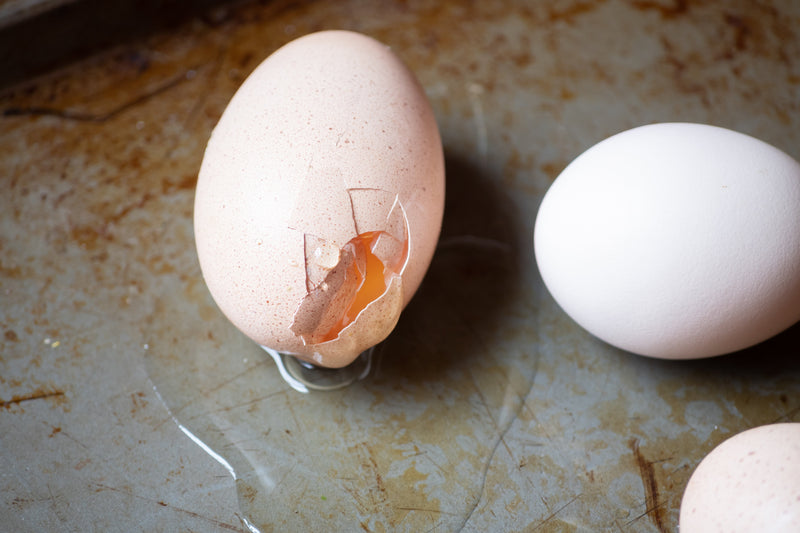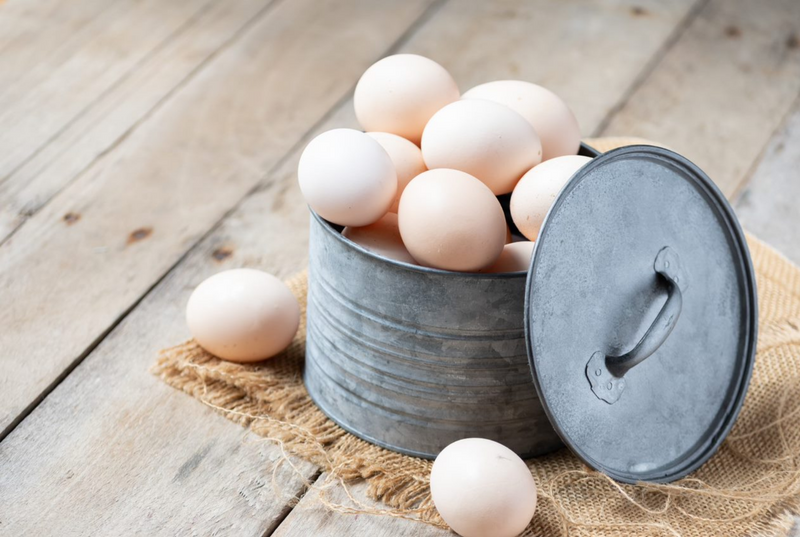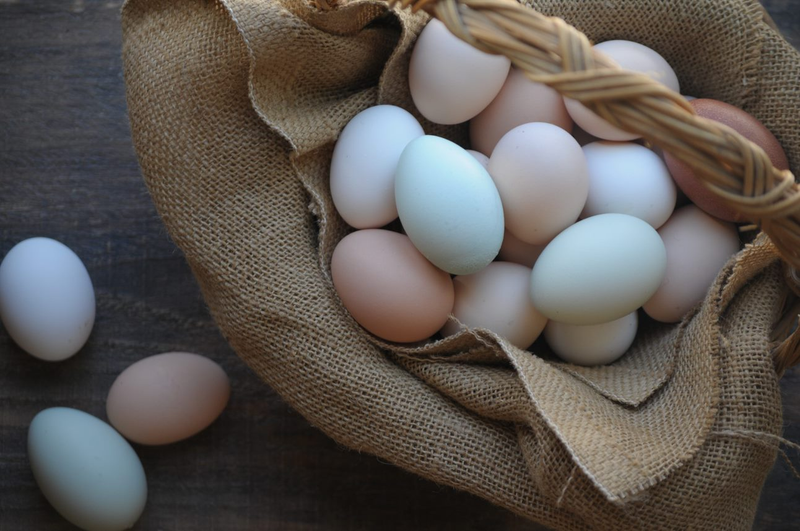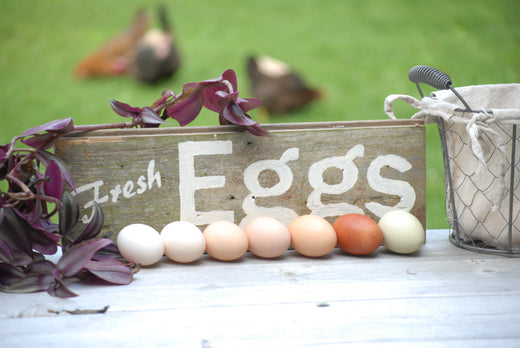Raising chickens for fresh eggs is a great way to become more self-sufficient by having a fresh and reliable source of food right in your own backyard. However, figuring out how many hens you need for reliable egg production can be tricky. How well a hen lays depends on a variety of factors including age, breed, genetics, the weather, and her diet. This guide will help you better understand how many hens you need for reliable egg production for your own needs or to sell.
How Many Chickens Do You Need for Eggs?
When determining how many chickens you need for reliable egg production, you first need to figure out how many eggs you want to get a week. Chicken math!
Whether you plan on using the eggs yourself or selling the eggs, the first step to calculating your flock size is to make a goal for how many eggs you want per week.
Once you know how many eggs you use or need in a week, now you need to crunch some numbers!
Here is a general equation you can start with:
Total # of chickens x 2/3 = daily amount of eggs you will get
Finding a More Exact Number for Egg Production
To determine a more precise number of chickens you’ll need to keep you and your family enjoying eggs as needed, follow these steps:
- Determine the number of chickens you think you might like to raise (or are allowed to raise in your area).
- Then figure out roughly how many eggs you could expect from that number of chickens, using the equation above.
- Next, adjust the number of hens to determine your ideal flock size. To do so, use the total from the equation above, then you can add or subtract birds from the initial total. With some tweaking, you’ll land on your ideal flock size.
For example, if you plan on a 5-chicken flock, but want 6 eggs per day, you’ll need to add 5 more chickens to your plan (based on the following math):
Plan: 5 hens x ⅔ = 3.33 eggs per day
Egg Goal: X hens x ⅔ = 6 eggs per day
Solution: 10 hens x ⅔ = 6.66 eggs per day
Keep in mind, even when using that equation, you’re better to err on the side of a few more hens in your flock to account for issues that may arise and other factors (which we’ll dive into).
Some Egg Productions Estimates for Planning Your Flock
To simplify things, we have figured out a few rough estimates for the number of chickens you should have based on how many eggs you want per day.
Keep in mind that this is eggs per day, not per week.
- 1 egg per day = 2 chickens
- 2 eggs per day = 3 chickens
- 4 eggs per day = 8 chickens
- 8 eggs per day = 15 chickens
- 12 eggs per day = 24 chickens
Planning for Egg Production Per Week
Looking at a weekly basis, you should factor in that some hens will skip a day while other hens will lay on that day.
If you wanted to get about a dozen eggs per week, you would need between 3 to 5 laying hens.
For two dozen eggs a week, you would need to double those numbers for a flock size of between 6 to 10 laying hens.
Factors that Affect How Well a Hen Lays

Six to ten laying hens for two dozen eggs may sound like a wide range. However, you must consider all the other factors that affect how well a hen lays before deciding on the best flock size for reliable egg production for your needs.
A hen’s productivity will be influenced by these factors:
- Age: Chickens lay best during the first 1 to 2 years of their life, after which their laying cycle will slowly get longer.
- Breed: Some breeds of chickens are better layers than others and will produce more eggs on a regular basis (scroll down for more information).
- Genetics: Certain strains (or varieties) within a breed will lay better than others, for example, White Leghorns will lay better than silver leghorns.
- Hot Weather: Hens will decrease production during hot weather. This is because your hens are reserving their energy to deal with the extreme temperature.
- Molting: Hens over one year of age will go through an annual fall molt in which they will stop laying in order to focus more nutrients on feather regrowth.
- Winter: Hens will often stop laying during the winter due to short daylight hours and cold temperatures.
- Diet: A laying hen needs a sufficient, well-balanced diet in order to be at peak egg production.
The Laying Cycle
Hens have a laying cycle. Within the laying cycle, it takes about 24 hours for an egg to form. Which means when a hen lays an egg one day, it will be at least 24 hours or slightly more before she lays another egg. A hen will lay her egg a little later each day until she ends up skipping a day. For hens who are good layers, this usually averages out to getting one egg two out of three days.
Planning for the Future & Increasing Egg Production
Despite the fact that hens will not lay every day and that there are many factors that can decrease or stop egg production, you can still plan those factors into determining how many chickens you need for reliable egg production.
Refresh Your Flock
If you want reliable egg production for many years, you will need to plan on adding new chickens to your flock every 2 years.
Provide the Highest Quality Diet
You will also need to plan on feeding your flock a high-quality, well-balanced layer feed to ensure that they get the nutrition they need to lay well. Add in high-calcium snacks or calcium supplements for a boost in calcium. Dietary deficiencies can lead to a drop in egg production and unhealthy hens.
Support Hens Through Molting & Winter
There are two times during the year in which you should expect to get few to no eggs from your flock: molting season and deep winter.
Molting & Egg Production
Molting season usually occurs in late summer and fall. It is when a hen loses all her old feathers and grows in new feathers. During the molt, most hens will stop laying in order to put energy towards growing new feathers.
Generally, not all of the hens in your flock will molt at the same time, especially if you have a large flock. Even though you might not be getting the maximum number of eggs per day from your flock, you may at least get a few eggs from the hens who haven’t started molting yet.
Providing your hens with supplemental protein is a great way to help them regrow their feathers, so they can return to laying more readily.
What to Expect During Winter
If you live in a region that gets less than 12 to 16 hours of light during the fall and winter months, then you should also expect to get few to no eggs during this time. Laying hens need 12 to 16 hours of light per day in order to lay well.
Some northern chicken keepers use supplemental artificial light to keep their hens laying during the winter months. However, extremely cold temperatures will still decrease egg production no matter how much light the hens receive.
Choosing the Right Chicken Breeds for Egg Production

What breed of chickens you own is a major factor in how well your girls will lay. When choosing new additions to your flock, you will want to select strong layers. How can you tell a chicken’s laying potential? Chicken breeds can be put into several different categories based on how well they lay.
Excellent layer breeds will lay 5 to 6 eggs a week. There are not many breeds in this category. Most chickens that are excellent layers are commercial strains or hybrids. These include:
- White Leghorns
- Isa Browns
- Golden Comets
- Black Stars
Good layers will lay about 4 to 5 eggs a week. Many heritage and dual-purpose chicken breeds are considered good layers. These include:
- Rhode Island Reds
- Plymouth Rocks
- Australorps
- Wyandottes
In general, lighter-weight chicken breeds are often more prolific layers than heavier-breed chickens.
Choosing Laying Breeds Based on Your Climate
Chicken breeds known to be good egg layers can provide you with ample eggs almost all year round. However, you’ll also need to consider which breeds are best for your region's climate. Heat-tolerant breeds will lay better during hot weather. Cold hardy breeds will lay better during the winter and in cold climates. So, always look into a potential breed’s hardiness before committing.
Light breed chickens are usually more heat tolerant and less cold hardy. Heritage breeds and dual-purpose chickens breed tend to be on the heavier side, but they are often both heat-tolerant and cold-hardy.
Can I Get Eggs All Year-Round?
Realistically, there is no way to guarantee year-round egg production–no matter what chickens make up your flock. The fall molt will always slow down egg production and in many regions, shorter winter days will stop egg production as well.
Instead of anticipating year production, think of eggs as being a seasonal food. Your flock will produce the best during the spring and summer. This is when you can expect to get the highest number of eggs from your flock.
The good news is that there are many ways to preserve fresh eggs when you have an abundance. If you want year-round eggs, aim to preserve your surplus and add a few more hens to your flock.
Some easy ways to make your eggs last include:
- Storing eggs at room temperature–don’t wash off the bloom!
- Refrigerating eggs–can last up to 5 weeks
- Freezing eggs–includes raw eggs and cooked eggs
- Pickling eggs–can last up to 6 months
Counting Your Eggs Before… They Are Laid

Planning your flock size can feel like a daunting task. However, if you use the formula provided and err on the side of adding a few extra hens to your chicken household, you will find yourself in egg equilibrium. To support your gals as they help make your egg dreams come true, provide them with a safe coop, proper care, and good quality nutrition. Keep in mind the happier your hens, the healthier their egg production!





